Det ekstra leddet? En kvalitativ studie om samarbeidet mellom kommunal psykisk helsetjeneste og ambulerende akutteam.
Master thesis
Permanent lenke
http://hdl.handle.net/11250/2380034Utgivelsesdato
2015Metadata
Vis full innførselSamlinger
Sammendrag
Background:
When crisis resolution team (CRT) was started up, there was meant to be a telephone number you called for an assessment of a user's need for admission. It has proved in hindsight that it is not the way it works. There is a decline in the number of hospital beds, and users should instead be offered home treatment. After a few years of experience, my view is that cooperation is not optimal between mental health workers in the municipality and CRT.
Resarch question and aim:
The purpose of this study is to examine how department managers in municipal mental health experience the cooperation with CRT:» what works well and what works less well. The issue is: What experience do managers in municipal mental health have with the cooperation of the ambulatory emergency team? «
Range and method:
It made a qualitative study and data collection is done by interviews with department managers in municipal mental health services. The study was done with inspiration from hermeneutics and phenomenology. Data collection is done by strategic choice of 5 department managers in mental health work in municipalities that fall under the same CRT. 4 informants have more than 3 years experience, one has less than a year.
Results:
Mental health workers in the municipality uses CRT when the crisis has occurred. Department managers in municipalities furthest physically away from CRT is most satisfied, as they work in advance and they do not wait until the crisis is occurring. All the informants expressed a wish for a meeting venue in order to exchange experiences and get to know each other. Experience shows little or no cooperation between CRT and municipal mental health services and there are ambiguities around responsibilities and task distribution.
Conclusion:
CRT is perceived as an additional element. There is little or no cooperation on home treatment of users and unresolved responsibilities and duties.
Key words:
Crisis resolution team, teamwork, interdisciplinary cooperation, roles, interaction
Beskrivelse
Masteroppgave psykisk helsearbeid- Universitetet i Agder, 2015
